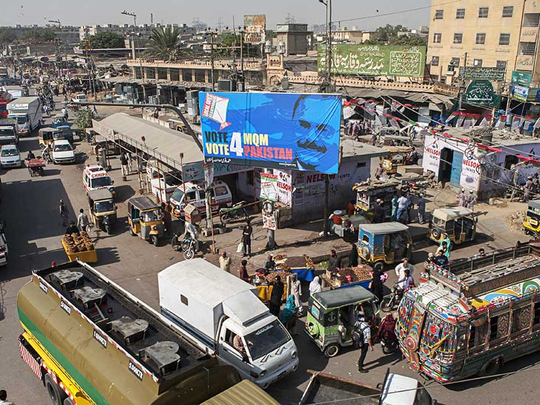
Pakistan’s latest set of taxes — at a whopping Rs40 billion (Dh1.39 billion) just in the past week — to meet commitments for a loan from the International Monetary Fund (IMF), says much about the increasingly questionable choices made by the country’s ruling structure. The new taxes were slapped on a series of items, including imported powdered milk and cheese — seen by the authorities as items of choice for the affluent who are few in number.
Though an unconvincing pretext, given that powdered milk is often used by low-income households in the country’s bitterly cold northern parts during winter, the measure has left a broader question too. Is the nuclear-armed and strategically important south Asian country now well under the control of a pathetically self-serving and uncaring set of rulers? Tragically, the answer to that critical question is in the affirmative.
While Pakistanis are being forced to tighten their belts, the rich seem to get away scot free. In an unprecedented move earlier this year, the government of Prime Minister Nawaz Sharif extended the annual deadline for payment of income tax by three months.
Originally set for the end of September, an apparently failing tax collection system pushed the deadline to the end of this month. The change has been made on the pretext of a faulty electronic filing system, which got repeatedly stuck as users sought to file their tax returns online. Meanwhile, it’s far from clear if indeed the self-serving ruling structure will even modestly improve collections for the year when the deadline finally arrives.
Across Pakistan, a crisis over rural income came to the fore this year when prices of essential commodities practically crashed in belts producing rice or cotton. Prospects for the main winter wheat crop are already looking far from promising, given that Sharif’s regime has decided to leave the official price unchanged from a year ago. All this has happened after a significant reduction in global petrol prices, which subsequently prompted many countries to pass on the bonus to end-users. Yet in Pakistan that has only been partially true.
Amid this atmosphere of gloom all around, Sharif and his partners in the ruling party are still keen to carry on with their misplaced commitments to fancy schemes such as building new roads and starting new bus projects. With little to show by way of a dramatic lift in tax collections, the final bill for these mega schemes will indeed be met by borrowing more money in a country where the increasing debt burden is already looking unsustainable.
Exactly what drives Pakistan’s rulers to make such choices is difficult to fathom in the midst of a continuing crisis triggered by deep-rooted security challenges. In the past year, the Pakistan army forced the growing tide of Taliban militants to be pushed back. Yet, the fight is far from over as the victory must be consolidated with further measures, notably to tackle large-scale poverty. However, stabilising Pakistan by improving the life of the common man does not seem to be part of the government’s agenda.
It is hard to imagine the country becoming a happier place for the broadest segment of its population.
Tragically, the far too few who stand to gain from the government’s choices will not be hit by measures such as more expensive cheese, powdered milk or other imported commodities.
In sharp contrast, ordinary Pakistanis continue to suffer from poorly-maintained government hospitals and government-funded schools — experiences the rich never have to grapple with. It is here that Pakistan’s destiny will be made or destroyed. Poorly-run hospitals and schools will only cater to the ever-growing community of Pakistan’s under-possessed. A visit to any of these facilities immediately unveils evidence of how Pakistan’s rulers simply don’t care about the mainstream population. A few fanciful projects reflect government apathy and sheer tokenism. These projects only offer lip-service to the common people, whose fortunes are heading southwards.
A bitter truth
Some in Pakistan are still hopeful that the country’s democratic structure will evolve and improve its performance. Yet, the people’s representatives are just not willing to stand up for the cause of the masses.
A visit to the parliament in Islamabad, or indeed the provincial legislatures across Pakistan, reveals a bitter truth. Going through the day-to-day proceedings in any of these forums immediately demonstrates the detachment of the people’s representatives from the core issues confronting the public on a daily basis.
In a nutshell, Pakistan is confronted with a deeply troubling question. Is democracy in its present form working? Apparently not. Should Pakistan opt out of the democratic path? Definitely not.
Yet saving Pakistan’s democracy requires a number of long-overdue and critical changes. First and foremost, the country’s influential lot need to be taken through an unprecedented period of accountability. Ruling politicians, including those accused of corruption, must be thoroughly investigated, charged and convicted if found guilty. Failure to do so will only lead Pakistan towards an all too predictable future — a series of obvious policy failures, ultimately leading to the failure of democracy.
Farhan Bokhari is a Pakistan-based commentator who writes on political and economic matters.










